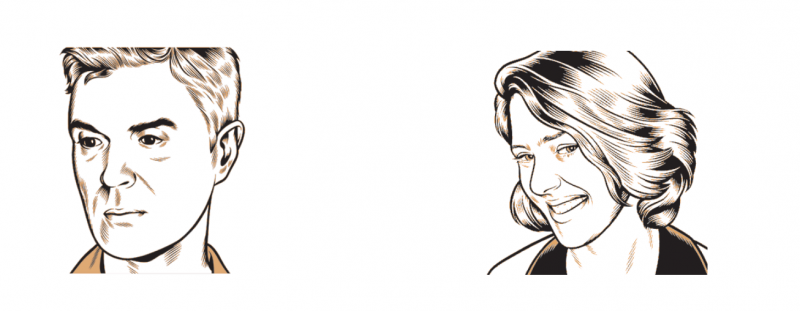David Byrne is an artist and musician and the author of several books, including Strange Ritual (1995), Your Action World (1999), The New Sins/Los Nuevos Pecados (2002), and Envisioning Emotional Epistemological Information (2003). His latest book, Arboretum, is a collection of faux-scientific diagrams in pencil—more information is available online here.
Olivia Judson is an evolutionary biologist whose best-selling book Dr. Tatiana’s Sex Advice to All Creation: The Definitive Guide to the Evolutionary Biology of Sex (2002) was recently made into a television series for the U.K.’s Channel 4. In her book and on the show, Judson takes on the persona of Dr. Tatiana to counsel frustrated animals such as the drone bee whose genitals have just exploded inside his queen, or the confused, hermaphroditic slug with a penis on his/her head.
This conversation was conducted by email shortly after the publication of Arboretum.
I. SYMPATHY FOR THE ANIMAL KINGDOM
DAVID BYRNE: Your book, and now your TV series, obviously anthropomorphize critters—not in the cute old Bambi way, but enough so that we as readers—or watchers—empathize with the bugs and fishes needing to be battered (almost raped in some cases) before sex, or males who are at their best when their heads come off. Loaded examples, which is what I’m getting at. One could easily find biological justification here for socially unacceptable behavior—and you could be seen as putting those ideas into the heads of future perverts. Justifying, somewhat, somehow, depraved behavior. What kind of sex advice column (or TV series) cites such—to us—horrific stuff and morally repugnant behavior? Won’t you have your sex advice column license taken away or be cited in some horrible trial (the Dr. Tatiana defense as opposed to the Twinkie defense)? This, to me, leads to a lot of questions about our (supposed) morality and the (supposed) lack of it in creature behavior.
OLIVIA JUDSON: You raise several points here. First: anthropomorphism. When I was an undergraduate studying biology, I was taught never to anthropomorphize: it was thought to be dangerous, and likely to lead to all sorts of misplaced sympathies for animals. However, I’ve come to think that as long as everybody knows that the anthropomorphism is not a literal description of what the animal experiences, but a description of what it seems to us to experience, then it’s actually a good thing. It aids the imagination. And actually, I’d say that a stern refusal to anthropomorphize is the more insidious sin. For that says that we are so different from other organisms that their experiences are completely unlike ours. And although that probably is true for something...
You have reached your article limit
Sign up for a digital subscription and continue reading all new issues, plus our entire archives, for just $1.50/month.
Already a subscriber? Sign in





